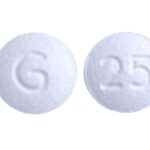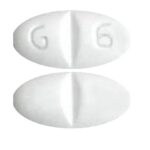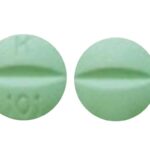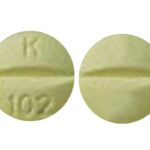N 25 Pill: Uses, Dosage, High, Side Effects, Warnings
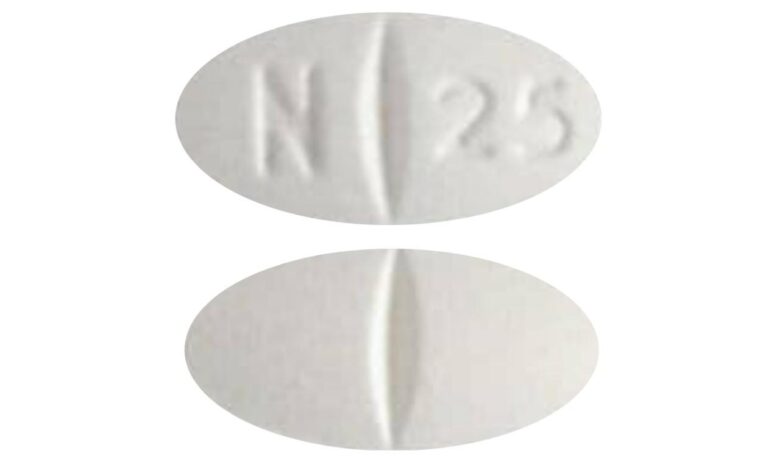
The white, elliptical / Oval pill with the imprint N 25 has been identified as Metoprolol Succinate Extended-Release 25 mg supplied by Ingenus Pharmaceuticals, LLC. Metoprolol is used alone or in combination with other medications to treat high blood pressure. It also is used to prevent angina (chest pain) and to improve survival after a heart attack. Metoprolol also is used in combination with other medications to treat heart failure. Metoprolol is in a class of medications called beta blockers. It works by relaxing blood vessels and slowing heart rate to improve blood flow and decrease blood pressure.
High blood pressure is a common condition and when not treated, can cause damage to the brain, heart, blood vessels, kidneys and other parts of the body. Damage to these organs may cause heart disease, a heart attack, heart failure, stroke, kidney failure, loss of vision, and other problems. In addition to taking medication, making lifestyle changes will also help to control your blood pressure. These changes include eating a diet that is low in fat and salt, maintaining a healthy weight, exercising at least 30 minutes most days, not smoking, and using alcohol in moderation.
How to take N 25 pill
Take this medication by mouth, with or right after a meal, as directed by your doctor, usually 1-3 times a day. The dosage is based on your medical condition and response to treatment.
To reduce your risk of side effects, your doctor may direct you to start this medication at a low dose and gradually increase your dose. Follow your doctor’s instructions carefully.
Use this medication regularly to get the most benefit from it. To help you remember, take it at the same time(s) each day. Do not suddenly stop taking this medication without consulting your doctor. Your condition may become worse when the drug is suddenly stopped.
For the treatment of high blood pressure, it may take several weeks before you get the full benefit of this drug. Keep taking this medication even if you feel well. Most people with high blood pressure do not feel sick.
To prevent chest pain, a second heart attack, or migraine headaches, it is very important to take this medication regularly as prescribed. This drug should not be used to treat chest pain or migraines when they occur. Use other medications to relieve sudden attacks as directed by your doctor (for example, nitroglycerin tablets placed under the tongue for chest pain, “triptan” drugs such as sumatriptan for migraines). Consult your doctor or pharmacist for details.
Tell your doctor if your condition does not improve or if it worsens (for example, if your routine blood pressure readings remain high or increase, if your chest pain or migraines occur more often).
What are the side effects of N 25 pill?
N 25 pill can cause certain side effects.
More common side effects
The more common side effects that can occur with N 25 pill include:
• tiredness
• dizziness
• diarrhea
• constipation
• breathing problems such as shortness of breath, cough, and wheezing
• bradycardia (heart rate that’s slower than normal)
• reduced interest in sex
• rash
If these effects are mild, they may go away within a few days or a couple of weeks. If they’re more severe or don’t go away, talk to your doctor or pharmacist.
Serious side effects
Call your doctor right away if you have serious side effects. Call 911 if your symptoms feel life-threatening or if you think you’re having a medical emergency. Serious side effects and their symptoms can include the following:
• Low blood pressure (hypotension). Symptoms can include:
o severe dizziness
o lightheadedness
o fainting
• Cold hands and feet. Symptoms can include
o hands and feet that are cold and may be painful
• Very slow heart rate (severe bradycardia)
• Extreme fatigue. Symptoms can include:
o feeling more tired than usual
o tiredness that gets progressively worse each day
• Serious depression. Symptoms can include:
o continuous feelings of sadness or anxiety
o feelings of hopelessness or worthlessness
o lack of interest in hobbies you once enjoyed
o eating too much or too little
o trouble concentrating
Metoprolol may interact with other medications
Metoprolol oral tablet can interact with other medications, vitamins, or herbs you may be taking. An interaction is when a substance changes the way a drug works. This can be harmful or prevent the drug from working well.
To help avoid interactions, your doctor should manage all of your medications carefully. Be sure to tell your doctor about all medications, vitamins, or herbs you’re taking. To find out how this drug might interact with something else you’re taking, talk to your doctor or pharmacist.
Examples of drugs that can cause interactions with metoprolol are listed below.
Mental health drugs
Taking metoprolol with reserpine and monoamine oxidase inhibitors (MAOIs) may increase or add to the effects of metoprolol. They may also increase lightheadedness or slow your heart rate more. MAOIs can continue to interact with metoprolol for up to 14 days after taking them. Examples of MAOIs include:
• isocarboxazid
• phenelzine
• selegiline
• tranylcypromine
Heart rhythm drugs
Taking heart rhythm drugs with metoprolol can slow down your heart rate too much. Examples of these drugs include:
• digoxin
• quinidine
• propafenone
Calcium channel blockers
Like metoprolol, these drugs are used to treat high blood pressure and several other heart problems. Combined with metoprolol, calcium channel blockers may slow your heart rate even more. Doctors sometimes use this combination under close supervision.
Examples of calcium channel blockers include:
• amlodipine
• diltiazem
• felodipine
• isradipine
• nicardipine
• nifedipine
• nimodipine
• nisoldipine
• verapamil
Drugs processed in the same way as metoprolol
Drugs used to treat depression and other mood disturbances are processed in your body by the same systems as metoprolol. Using these drugs with metoprolol could increase the levels of metoprolol in your body. Examples of these drugs include:
• fluoxetine
• fluvoxamine
• paroxetine
• sertraline
• bupropion
• clomipramine
• desipramine
• chlorpromazine
• fluphenazine
• haloperidol
• thioridazine
Other drugs that are processed in the body the same way as metoprolol include:
• the antiretroviral ritonavir
• antihistamines, including diphenhydramine
• antimalarial drugs, such as hydroxychoroquine and quinidine
• antifungal drugs, such as terbinafine
• the blood pressure drug hydralazine
These drugs can all increase the level of metoprolol in the body.
Alpha-blockers
Alpha-blockers also lower blood pressure. They may decrease blood pressure too much when combined with metoprolol. Examples of these drugs include:
• reserpine
• alpha-methyldopa
• clonidine
• prazosin
Clonidine must be carefully managed if it’s combined with metoprolol. Stopping the drug suddenly while also taking metoprolol can cause a big jump in blood pressure.
Ergot alkaloids
Ergot alkaloids, such as dihydroergotamine, narrow blood vessels to treat headaches. If you take them at the same time as metoprolol, they may cause dangerous narrowing of blood vessels.
Dipyridamole
Dipyridamole is used for heart testing. Because metoprolol affects your heart rate, you should stop taking it before you’re given dipyridamole to help ensure an accurate test result.
You may find useful information on: What To Do If You Accidentally Took Double Dose of Metoprolol?

